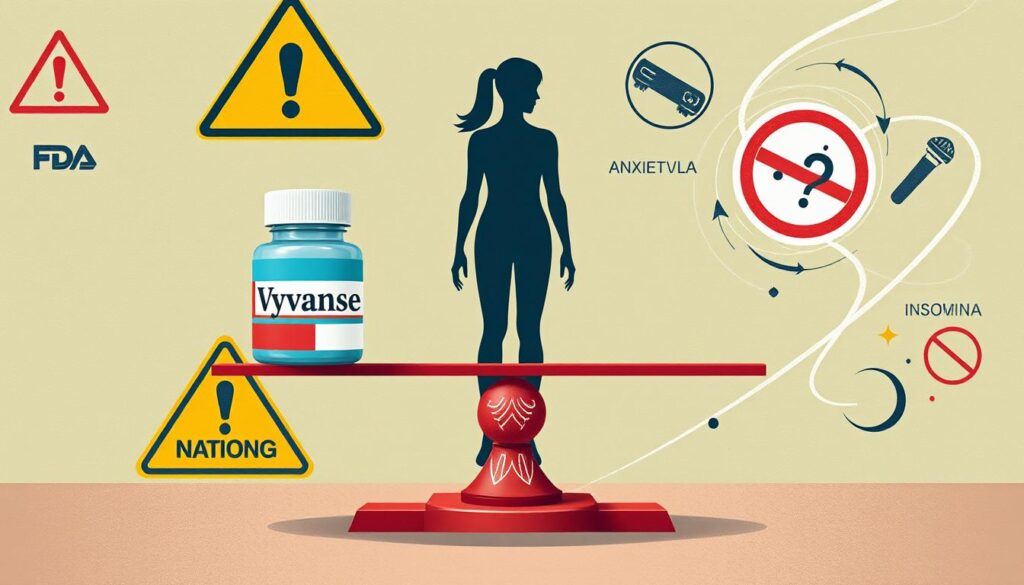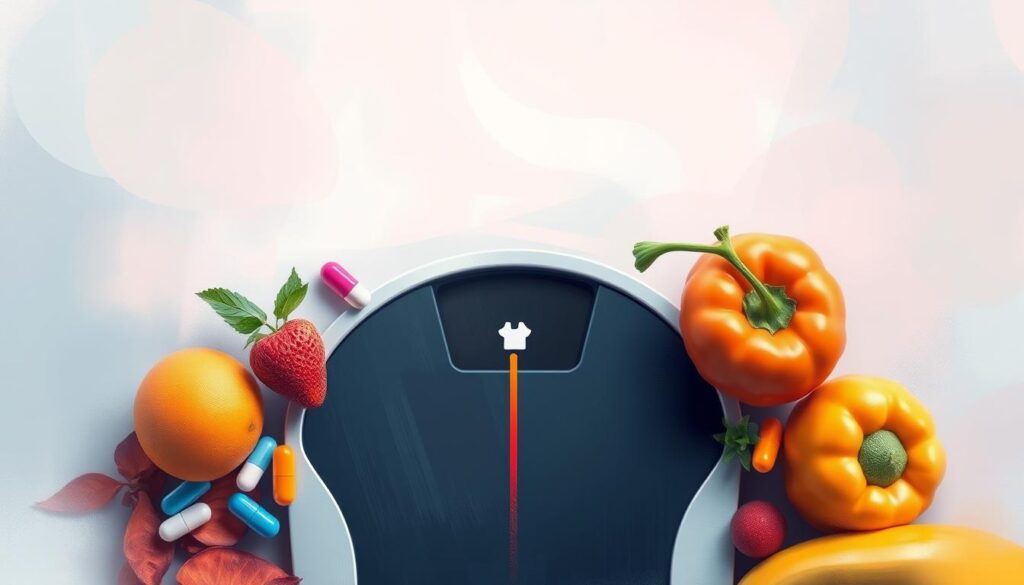Vyvanse is a medicine for ADHD and binge eating disorder. It can cause weight loss as a side effect. This is not its approved use. It’s important to know how it affects your body and what to do if you take it.
Adults on Vyvanse lost 2.8 to 4.3 pounds in four weeks. Kids aged 13 to 17 lost 2.7 to 4.8 pounds. Kids aged 6 to 12 lost 0.9 to 2.5 pounds. Vyvanse works by making more dopamine and norepinephrine in the brain. This might make you eat less.
Vyvanse is not for losing weight or treating obesity. Using it for these can be very dangerous. It can cause high blood pressure, heart problems, and seizures. Vyvanse is a Schedule II drug. This means it can be addictive and cause dependence.
Key Takeaways
- Vyvanse can lead to unintended weight loss as a side effect, with clinical trials showing average losses of 0.9 to 4.8 pounds over four weeks.
- The weight loss is believed to be a result of Vyvanse’s mechanism of action, which increases dopamine and norepinephrine levels in the brain, potentially suppressing appetite.
- Vyvanse is not approved for weight loss or the treatment of obesity, and using it for these purposes can lead to serious health risks.
- Vyvanse is a Schedule II controlled substance, indicating its potential for addiction and the possibility of physical and psychological dependence.
- It’s crucial to use Vyvanse only under strict medical supervision and follow your healthcare provider’s guidance to manage any weight changes safely.
Understanding Vyvanse and Its Primary Uses
Vyvanse is a medicine approved by the U.S. Food and Drug Administration (FDA). It helps with Attention Deficit Hyperactivity Disorder (ADHD) in adults and kids 6 and up. It’s also used for binge eating disorder in adults.
FDA-Approved Applications
The FDA has approved Vyvanse for these uses:
- Treatment of ADHD in adults and children aged 6 and older.
- Management of moderate to severe binge eating disorder in adults.
How Vyvanse Works in the Body
Vyvanse is a long-acting stimulant. It turns into dextroamphetamine in the body. This balances brain chemicals, improving focus and controlling impulses.
The effects last up to 12 hours, starting within an hour of taking it.
Treatment Duration and Effects
Vyvanse is taken once a day in the morning. It may take weeks to see improvements in ADHD or binge eating disorder. Always talk to your doctor about how it’s working and any side effects.
“Vyvanse has been a game-changer for me. It has helped me manage my ADHD symptoms and regain control over my binge eating habits. I’m grateful to have this medication as part of my treatment plan.”
– Emily, a Vyvanse user
Weight Loss on Vyvanse: Mechanism and Effects
Vyvanse is used to treat ADHD and BED. It can help with weight loss too. The exact reason is not clear, but it might be because it makes you feel less hungry and boosts your metabolism.
Vyvanse works by improving focus and control. It does this by changing how dopamine and norepinephrine work in the brain. This can make you eat less, leading to weight loss.
Studies show adults on Vyvanse lose 2.8 to 4.3 pounds in four weeks. But, not everyone loses weight. How much you lose depends on many things like how much you take and how long you take it.
The FDA didn’t approve Vyvanse for weight loss. It’s not proven to be safe or effective for this. To lose weight, you should also eat well, exercise, sleep enough, and manage stress.
| Statistic | Value |
|---|---|
| Estimated lifetime global prevalence of BED | 0.9–2.2% |
| Weight loss with 50 and 70 mg LDX compared to placebo | Reduced binge-eating episodes and weight |
| Sample size for the LDX study | 22 participants |
| Participant dropout rate in the LDX study | 1 due to vomiting |
Vyvanse might help with weight loss, but it’s different for everyone. It can make you eat less and boost your metabolism. But, you need to watch how you’re doing and manage your weight in other ways too.
The Connection Between Vyvanse and Appetite Suppression
Vyvanse is a drug used for ADHD and binge eating disorder. It affects appetite. This happens because of how it works in the brain.
Impact on Brain Chemistry
Vyvanse has lisdexamfetamine as its main ingredient. It boosts dopamine and norepinephrine in the brain. These help control mood, focus, and appetite.
By increasing these, Vyvanse helps reduce the need to eat. This makes it good for treating binge eating disorder.
Duration of Appetite Changes
Vyvanse’s effects on appetite last all day while it’s in your system. People taking it might eat less for 8 to 12 hours. This depends on the dose.
Managing Reduced Appetite
Reduced appetite from Vyvanse is good for some. But, it’s key to eat enough. Ways to manage this include:
- Eating regular, balanced meals at set times to prevent nutrient deficiencies
- Staying hydrated by drinking water throughout the day
- Consulting with a healthcare provider or nutritionist to develop a personalized plan for maintaining proper nutrition
Knowing how Vyvanse affects appetite helps. People can work with their doctors. This way, they get the benefits while staying healthy.
Safety Concerns and FDA Warnings
Vyvanse is approved for ADHD and BED. But, it’s important to know the safety issues and warnings. The FDA warns against using vyvanse just for weight loss. It’s not proven safe for obesity.
There’s a big risk of heart problems like sudden death and stroke in adults. It can also cause serious mental side effects. These need close watch by doctors.
Vyvanse is a Schedule II drug. This means it’s highly addictive. The FDA stresses the need to manage its use carefully. This is to avoid misuse and serious problems.
It’s key to follow the FDA’s dosage advice. For ADHD, start with 30 mg daily, up to 70 mg. BED patients start with 30 mg, aiming for 50 to 70 mg. Those with kidney issues may need lower doses.
It’s important to check blood pressure and heart rate often. Also, watch for signs of Raynaud’s and serotonin syndrome. These can be very serious.
The FDA says vyvanse is not proven safe for weight loss. Using these drugs for weight can lead to heart problems.
In short, vyvanse is good for ADHD and BED but be aware of the risks. Always follow the FDA’s advice for safe use.

Common Side Effects Beyond Weight Changes
While vyvanse weight loss is a big plus, other side effects can happen. Vyvanse, or lisdexamfetamine, helps with ADHD and binge eating. It’s a brain stimulant.
Physical Side Effects
Common physical side effects include dry mouth, nausea, and diarrhea. You might also feel constipated or have trouble sleeping. These usually go away as your body gets used to the drug.
If these problems don’t get better or get worse, tell your doctor right away.
Mental and Emotional Effects
Vyvanse can also affect your mind and feelings. Some people feel anxious, irritable, or notice mood swings. These feelings are serious and need watching.
When to Contact Your Healthcare Provider
If you have severe side effects or mood changes, call your doctor fast. Serious issues like heart problems or psychosis need quick help. Also, seek help right away for allergic reactions or severe heart symptoms.
Your health is most important. Knowing about side effects and talking to your doctor helps keep you safe while using Vyvanse.
Managing Weight Changes While on Vyvanse
If you’re taking Vyvanse, you might see unexpected weight changes. Vyvanse is not for losing weight, but it can make you eat less. This can lead to weight loss.
The main part of Vyvanse, lisdexamfetamine dimesylate, makes your brain send out dopamine and norepinephrine. These help you feel less hungry. This can make you eat less and lose weight fast, especially if you’re new to Vyvanse.
- Vyvanse may cause weight loss and suppressed growth in children ages 6–12 years
- A small 2022 study found that lisdexamfetamine dimesylate improved feelings of satiety and reduced the brain’s reward response
- Vyvanse may suppress appetite by reducing impulsivity and improving attention
To handle weight changes on Vyvanse, eat well, drink lots of water, and move a lot. Even if you’re not hungry, try to eat at regular times. This helps you get the nutrients you need. Keep an eye on your weight and talk to your doctor about any big changes. They might need to change your dose or suggest ways to keep your weight healthy.
Remember, the main goal is to stay healthy, not just to lose weight with Vyvanse. Your doctor can help you find the right balance. This balance helps you manage ADHD symptoms and keep a healthy weight.

“Vyvanse is the only medication approved to treat binge eating disorder, but it’s important to focus on overall health rather than using it solely for vyvanse weight loss side effects.”
Risk of Dependence and Addiction
Vyvanse is good for some health issues but can lead to addiction. It’s a Schedule II controlled substance. This means it has a high chance of being misused.
Using too much or in the wrong way can cause big problems. It might lead to a serious addiction.
Signs of Medication Dependence
Here are signs someone might be addicted to Vyvanse:
- Needing more of the drug to feel the same effect
- Feeling sick when they stop or cut down on the drug
- Not being able to stop using the drug even if it hurts their life
Prevention Strategies
To avoid addiction, take Vyvanse only as your doctor says. Going to regular check-ups and talking openly with your doctor is key. This helps watch for any signs of misuse or addiction.
Seeking Professional Help
If you think you or someone you know might be addicted to Vyvanse, get help right away. Doctors can help manage the drug safely. They can also help stop using it if needed.
Getting the right treatment is important for recovery. It helps avoid going back to addiction.
Alternative Medications and Treatment Options
If you’ve had trouble with vyvanse for weight management or vyvanse binge eating disorder, you might want to look at other options. Vyvanse is approved by the FDA for ADHD and binge eating disorder. But it might not work for everyone.
For ADHD, you could try other medicines like methylphenidate (Ritalin, Concerta). Or non-stimulants like atomoxetine (Strattera) or guanfacine (Intuniv). These might be better if Vyvanse doesn’t work for you.
For binge eating disorder, talking therapies like cognitive behavioral therapy can help. There’s no FDA-approved medicine yet. But, some doctors might suggest antidepressants or other drugs.
For weight loss, you could look at orlistat, liraglutide, or phentermine-topiramate. But, these should only be used with a doctor’s help and as part of a bigger plan.
Talking to your doctor is key to finding the right treatment for you. They can help you understand your options. And they can make sure you’re safe and getting the best care.
| Medication | Indication | Common Side Effects |
|---|---|---|
| Methylphenidate (Ritalin, Concerta) | ADHD | Weight loss, dry mouth, insomnia |
| Atomoxetine (Strattera) | ADHD | Dry mouth, weight loss, insomnia, reduced appetite |
| Amphetamine/Dextroamphetamine (Adderall) | ADHD | Dry mouth, diarrhea, weight loss, anxiety, reduced appetite |
| Viloxazine (Qelbree) | ADHD | Dry mouth, weight loss, reduced appetite |
| Orlistat | Weight Loss | Oily stools, gas, abdominal pain |
| Liraglutide | Weight Loss | Nausea, vomiting, diarrhea |
| Phentermine-Topiramate | Weight Loss | Dry mouth, constipation, insomnia |
Changing your medicine or treatment plan should always be talked about with your doctor. They can make sure you’re safe and help you make the best choice for your health.
Healthy Weight Management Strategies
Keeping a healthy weight can be hard, especially with Vyvanse. But, you can do it with the right mix of food, exercise, and lifestyle. It’s all about making lasting changes, not quick fixes.
Balanced Nutrition
Eating foods full of nutrients is key. The National Institutes of Health say to eat:
- Plenty of fruits and vegetables
- Whole grains
- Lean proteins
- Healthy fats like those found in nuts, seeds, and avocados
Regular Physical Activity
Exercise is vital for weight control. The National Institutes of Health say to do at least 150 minutes of moderate activity weekly. This can be brisk walking, swimming, or cycling. Also, do strength training two or more times a week to build muscle and boost metabolism.
Adequate Sleep and Stress Management
Good sleep and stress control help with weight management. Not sleeping enough and too much stress can make you gain weight. Try stress-reducing activities like meditation or yoga to help.
Personalized Guidance
Talking to health experts like dietitians or therapists is helpful. They can give you a plan that fits your needs, especially if you’re on Vyvanse. They help you tackle your specific challenges.
By using these strategies, you can reach your weight goals and stay healthy. Remember, losing weight is a journey, not a quick fix. With the right steps, you can succeed.
Monitoring and Medical Supervision
When you take Vyvanse, it’s important to see a doctor often. They will check your heart rate, blood pressure, weight, and how you feel mentally. They might change how much Vyvanse you take based on how it works and any side effects.
It’s important for you to watch how you feel and any weight changes. If you notice big changes, tell your doctor right away. Kids taking Vyvanse need to be watched closely to make sure it’s not affecting their growth.
Talking openly with your doctor is key. This helps manage any weight loss side effects and makes sure Vyvanse works well for you. You and your doctor can find the best way to use Vyvanse safely and effectively.
Regular Health Checkups
- Monitor heart rate, blood pressure, and weight
- Assess mental health status and well-being
- Adjust dosage as needed based on effectiveness and side effects
Tracking Progress and Adjustments
- Document your symptoms, side effects, and any weight changes
- Promptly report significant changes to your healthcare provider
- For children, closely monitor growth and development
By working closely with your healthcare team and watching your progress, you can use Vyvanse safely and effectively. This helps manage any side effects.
“Regular checkups and open communication with your doctor are crucial when taking Vyvanse to ensure the best possible outcomes.”
Conclusion
Vyvanse, also known as lisdexamfetamine dimesylate, can cause weight loss. But it’s not meant for losing weight. It’s mainly used to help with ADHD and binge eating disorder in adults.
If you notice weight changes on Vyvanse, talk to your doctor. Losing weight safely means eating right, exercising, and getting medical help. Always take Vyvanse as your doctor says and know its possible side effects.
Vyvanse isn’t a quick fix for losing weight. It might help some people lose weight, but it’s not for that purpose. Your health and safety should always come first when thinking about taking any medicine, including Vyvanse.

